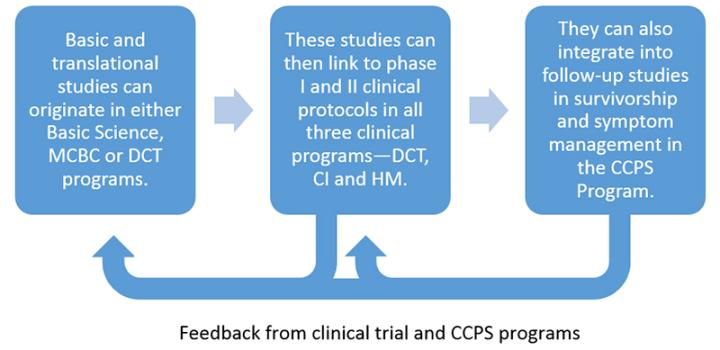Comprehensive Cancer Center Research Programs
Bringing together the best minds in medicine
Breakthroughs in cancer research depend on connections, on collaboration, on interaction between the best and brightest scientists and clinicians available. As a comprehensive cancer center, City of Hope brings those very experts together and provides them with a multidisciplinary environment where dedicated professionals focused on every type of research — basic, clinical and translational, prevention and control – share insights and build innovation.
Basic Science Research Program
"Basic science" refers to research conducted in a laboratory setting, and our Molecular and Cellular Biology of Cancer program leverages both our extensive infrastructure and collaborate environment, delivering outstanding work. In turn, that research expands our understanding of the underlying genetic, molecular and biological bases of cancer.
Clinical and Translational Research Programs
Our clinical and translational research programs focus on translating the novel laboratory observations and discoveries provided by basic research into actual treatments for patients at City of Hope and, ultimately, around the world. Every year, the number of clinical trials (phases 1 and 1/2I) we conduct as a comprehensive cancer center increases. Our clinical and translational science research programs include:
Prevention and Control Program
As a comprehensive cancer center, prevention and control of cancer is a primary focus at City of Hope, and we’re pursuing it through our Cancer Control and Population Sciences (CCPS) program. CCPS members cover an extensive spectrum of disciplines, and are continually collaborating with physician investigators in four areas of exploration:
- Host and environmental determinants of cancer
- Health-related outcomes and quality of life after cancer
- Interventional studies to reduce cancer-related morbidity
- Educational initiatives
A Comprehensive Research Continuum
The research programs described above are part of a collaborative continuum where interaction and feedback between all closely-linked phases drive superior results. It’s made possible by City of Hope’s unique infrastructure, supporting both basic and translational research in biological and small molecule approaches to cancer.
